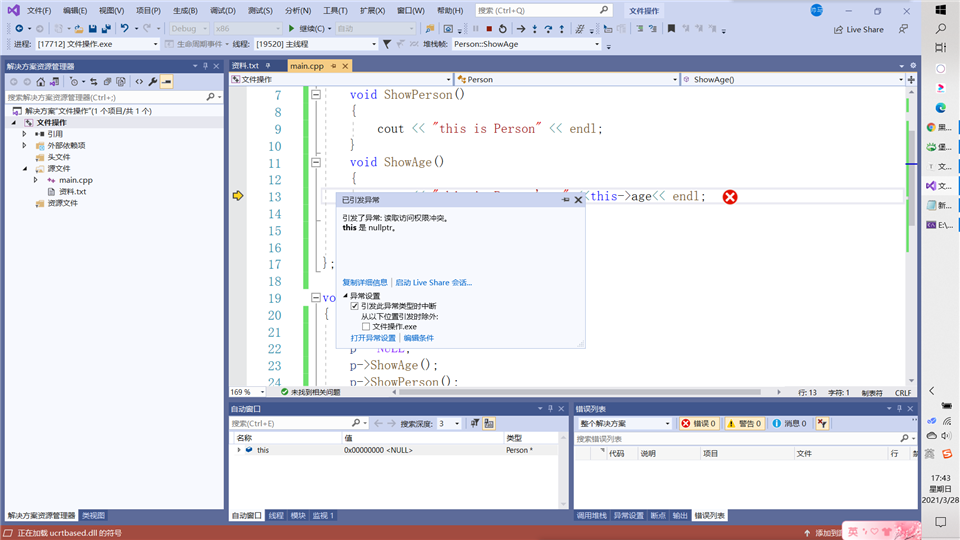在C++中成员变量和成员函数分开储存
只有非静态成员变量才属于类的对象上
静态成员函数,静态成员变量,非静态成员函数都不属于类对象上
#include<iostream>
using namespace std;
#include<string>
class Person
{
public:
int m_age;
static int m_name;
void func01()
{
}
};
static int m_age = 9;
void test01()
{
Person p;
cout << "sizeof:" << sizeof(p)<<endl;
}
int main()
{
test01();
return 0;
}
每一个非静态成员函数只会诞生一份函数实例,也就是说多个同类型的对象会共用一块代码
那么问题是:这一块代码是如何区分那个对象调用自己的呢?
c++通过提供特殊的对象指针,this指针,解决上述问题。
this指针指向被调用的成员函数所属的对象
this指针是隐含每一个非静态成员函数内的一种指针
this指针不需要定义,直接使用即可
this指针的用途:
class Person
{
public:
Person(int age)
{
//1、当形参和成员变量同名时,可用this指针来区分
this->age = age;
}
Person& PersonAddPerson(Person p)
{
this->age += p.age;
//返回对象本身
return *this;
}
int age;
};
void test01()
{
Person p1(10);
cout << "p1.age = " << p1.age << endl;
Person p2(10);
//链式编程思想
p2.PersonAddPerson(p1).PersonAddPerson(p1).PersonAddPerson(p1);
cout << "p2.age = " << p2.age << endl;
}
int main() {
test01();
system("pause");
return 0;
}
#include<iostream>
using namespace std;
#include<string>
class Person
{
public:
//1、解决名称冲突
Person(int age)
{
this->age = age;
}
//2、返回对象本身
Person* AddPerson(Person p)
{
this->age += p.age;
//this指向p2本身,*this指向p2这个对象的本体
return this;
}
int age;
};
void test01()
{
Person p(10);
Person p2(10);
p2.AddPerson(p)->AddPerson(p)->AddPerson(p);
cout << "p2的值为" << p2.age << endl;
}
int main()
{
test01();
return 0;
}
this指向p2本身,*this指向p2这个对象的本体
第一段代码返回*this是p的本体
链式调用的时候利用.来操作
第二段代码返回this是p指针
链式调用时用->来操作
#include<iostream>
using namespace std;
#include<string>
class Person
{
public:
void ShowPerson()
{
cout << "this is Person" << endl;
}
void ShowAge()
{
cout << "this is Person‘age" <<this->age<< endl;
}
int age;
};
void test01()
{
Person* p;
p = NULL;
p->ShowAge();
p->ShowPerson();
}
int main()
{
test01();
return 0;
}
执行结果如下:

//报错原因是传入this为NULL
解决方法:判断后若为空直接return
#include<iostream>
using namespace std;
#include<string>
class Person
{
public:
void ShowPerson()
{
cout << "this is Person" << endl;
}
void ShowAge()
{
if (this == NULL)
{
return;
}
//报错原因是传入this为NULL
cout << "this is Person‘age" <<this->age<< endl;
}
int age;
};
void test01()
{
Person* p;
p = NULL;
p->ShowAge();
p->ShowPerson();
}
int main()
{
test01();
return 0;
}
成员函数后面加const后我们称这个函数为常函数
常函数不可以修饰成员属性
成员属性声明时加关键词mutable后在常函数中依然可以修改
声明对象前加const称该对象为常对象
常对象只能调用常函数
#include<iostream>
using namespace std;
#include<string>
class Person
{
public:
void ShowAge()const
{
//this指针本质是指针常量Person *const this,指针指向是不可修改的
//也不可修改其指向为空
//在成员函数后面加const,修改的是this的指向,让指针指向的值也不可修改
//const Person *const this
//this->age = 89;
this->year = 90;
cout << "this is Person‘year:" <<this->year<< endl;
}
void func()
{
age = 90;
}
int age;
mutable int year;//特殊变量在常函数中也可以修改
};
void test01()
{
Person p;
p.ShowAge();
}
//常对象
void test02()
{
const Person p1;
//p.age = 90;
p1.year = 90;//year是特殊值可以修改
p1.ShowAge();//常对象只能调用常函数
//p1.func();因为通过普通成员函数可以间接修改属性
}
int main()
{
test01();
return 0;
}
原文:https://www.cnblogs.com/thrush/p/14589394.html